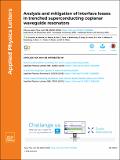Analysis and mitigation of interface losses in trenched superconducting coplanar waveguide resonators
Author(s)
Calusine, G; Melville, A; Woods, W; Das, R; Stull, C; Bolkhovsky, V; Braje, D; Hover, D; Kim, DK; Miloshi, X; Rosenberg, D; Sevi, A; Yoder, JL; Dauler, E; Oliver, WD; ... Show more Show less
DownloadPublished version (1.100Mb)
Publisher with Creative Commons License
Publisher with Creative Commons License
Creative Commons Attribution
Terms of use
Metadata
Show full item recordAbstract
© 2018 Author(s). Improving the performance of superconducting qubits and resonators generally results from a combination of materials and fabrication process improvements and design modifications that reduce device sensitivity to residual losses. One instance of this approach is to use trenching into the device substrate in combination with superconductors and dielectrics with low intrinsic losses to improve quality factors and coherence times. Here, we demonstrate titanium nitride coplanar waveguide resonators with mean quality factors exceeding two million and controlled trenching reaching 2.2 μm in the silicon substrate. Additionally, we measure sets of resonators with a range of sizes and trench depths and compare these results with finite-element simulations to demonstrate quantitative agreement with a model of interface dielectric loss. We then apply this analysis to determine the extent to which trenching can improve resonator performance.
Date issued
2018Department
Lincoln Laboratory; Massachusetts Institute of Technology. Research Laboratory of Electronics; Massachusetts Institute of Technology. Department of PhysicsJournal
Applied Physics Letters
Publisher
AIP Publishing